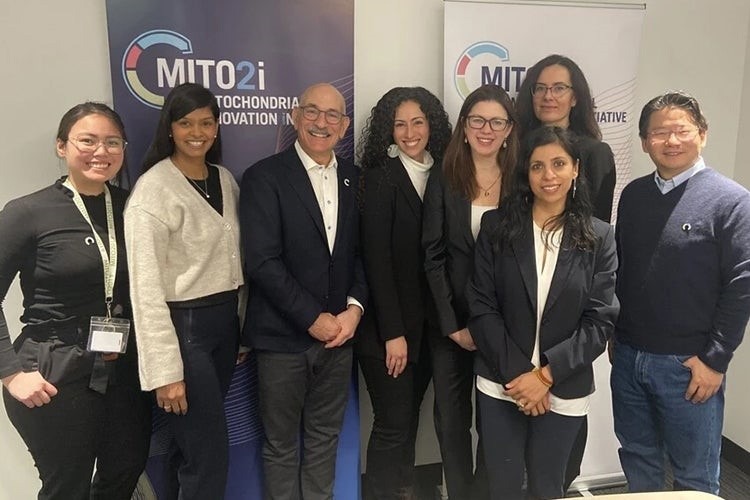A ‘mito-revolution’: U of T, Unity Health Toronto and UHN awarded $23.8M to co-lead mitochondrial transplant research

Members of the research team: (From left) Erika Beroncal, Sonya Brijbassi, Dr. Ori Rotstein, Dr. Mikaela Gabriel, Dr. Ana Andreazza, Dr. Sowmya Viswanathan, Dr. Milica Radisic and Dr. Frank Gu (supplied image)
A groundbreaking project led by scientists at Unity Health Toronto, the University of Toronto and University Health Network has been awarded $23.8 million to develop mitochondrial transplantation therapy. The research project addresses mitochondrial dysfunction, which underlies a wide range of health problems, including chronic diseases and organ failure after injury.
Funding for the project, titled “Mitochondrial Transplant: Powering the Revolution in Regenerative Medicine,” comes from the federal government’s New Frontiers in Research Fund (NFRF). It is one of just six projects across Canada that was awarded funding from the highly competitive NFRF. Dr. Ori Rotstein, Unity Heath Toronto vice-president of Research and Innovation and project principal investigator, is co-leading the project.
Enjoying this story? Sign up for the Unity Health Toronto newsletter, a monthly update on the latest news, stories, patient voices and research emailed directly to subscribers.
The success of this grant application is a testament to the ability of scientists from diverse fields working in collaboration to tackle the most complex healthcare challenges, Rotstein said. All of the institutions involved in the project are members of the Toronto Academic Health Science Network.
Mitochondria are the energy producers of our bodies’ cells. Their function is reduced in many disease states including heart attacks, stroke, traumatic shock and even during organ transplantation. Unfortunately, there are no existing treatments that can effectively reverse or mitigate mitochondrial dysfunction.
This research project proposes mitochondrial transplantation, where healthy mitochondria are introduced into injured cells or organs as a means to reverse the damage and restore function.
“This is a paradigm shift,” said Dr. Ana Andreazza, the project’s principal investigator and professor of pharmacology and toxicology with U of T’s Temerty Faculty of Medicine. “This isn’t about managing disease. It’s about restoring life at its most fundamental level — and ensuring that this breakthrough reaches everyone.”
Dr. Hagar Labouta, St. Michael’s scientist, grant co-applicant and assistant professor at the Leslie Dan Faculty of Pharmacy and Institute of Biomedical Engineering, says the project could revolutionize patient care.
“This project is revolutionary because we are developing innovative delivery methods that preserve mitochondrial viability and function right up to the point of transplantation,” she said.
“Maintaining the integrity of healthy mitochondria before they are introduced into damaged tissues is critical to the success of this therapy, and that’s where our contribution will have the biggest impact.”
The multi-disciplinary and cross-institutional research team will include experts in engineering, biology, medicine, and artificial intelligence, and will focus on developing safe, effective ways to transplant mitochondria into a damaged cell.
The team will use “organ-on-a-chip” technology, along with small and large animal models to test their approach. They’ll also build scalable systems for storing and delivering mitochondria and use AI to achieve maximum effectiveness. The end goal is to conduct clinical trials to demonstrate safety, feasibility and efficacy of mitochondrial transplant, and to potentially transform medical practice.
The team will work to ensure that the project will be ethical, inclusive and can be integrated for diverse communities across the globe, including Indigenous communities.
“The potential applications of this work could meet the needs of so many patients and community members that suffer under colonial health impacts,” said Dr. Mikaela Gabriel, St. Michael’s scientist and assistant professor at the Dalla Lana School of Public Health. Gabriel has joined the project to foster community co-direction.
“However, we can’t keep repeating the same extractional patterns that’ve caused so much medical harm and distrust. If there’s a new therapy that can help us, we need to have Indigenous voices front and centre – exploring our concerns, directing its applications, and providing feedback along the way. Our team offers a host of exceptional scientists who understand the need for education, consent, collaboration, and co-direction with our communities to make safe, informed choices about their healthcare.”
By: Marlene Leung
